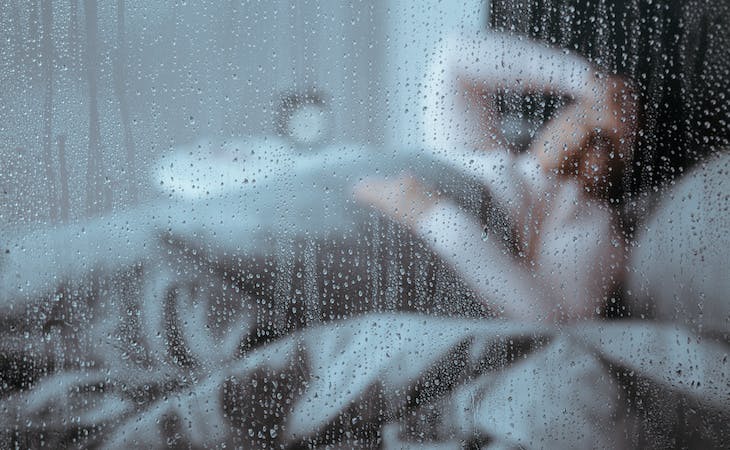Do you notice that you sleep better or worse depending on the season? If you think the weather affects the quality of your sleep, you may be on to something. It turns out there is quite a bit of science behind how certain types of weather and seasonal changes impact both your sleep and overall health.
“Weather influences on humans can be characterized by behavioral, physiological, and psychological aspects,” says Robert Carter III, PhD, expert in human performance and physiology and co-author of The Morning Mind: Use Your Brain to Master Your Day and Supercharge Your Life.
Here’s a look at how common weather patterns affect your sleep—and your health.
Barometric pressure and fatigue
Barometric pressure (also called atmospheric pressure) is the pressure within the atmosphere of the earth. When barometric pressure drops, wind, precipitation, or cloudy skies are more likely, whereas high barometric pressure leads to more stable weather.
Carter says that this pressure change can also do a number on your body.
“When atmospheric pressure drops with the onset of bad weather, the adjacent air transfers force against other joints,” he says. “We believe that this may explain moderate to severe joint pain in some patients. Another theory suggests that low pressure combined with low temperature may promote pain by boosting inflammation in the joint capsule.”
What does that have to do with sleep? Well, research shows chronic pain can make it harder to get quality shut-eye.
One study, conducted by the American College of Rheumatology, looked at how weather specifically affected women with fibromyalgia over 28 days.
The researchers conducted 50 analyses and found that in five (or 10%), weather variables showed a significant but small effect on either pain or fatigue. Insomnia is also common in people with fibromyalgia, so added discomfort brought on by weather can be even more detrimental to these patients.
Carter also notes that weather may have an impact on migraines.
“In susceptible individuals, extreme fluctuations in both temperature and humidity are correlated with more frequent migraines,” he says.
One migraine study found that “39 out of 77 participants were sensitive to weather changes, such as barometric pressure,” according to Healthline.
While scientists are still working through the relationship between migraines and sleep, there is a strong correlation between high migraine frequency and poor sleep quality.
Some doctors recommend keeping a migraine journal so you can better track and understand what may have triggered your migraine, including the weather.
If you think barometric pressure is the trigger for your health issues, talk to your doctor about possible treatments and solutions.
Why does rain make you sleepy?
While there’s not any definitive research proving that rain can make you more tired, anecdotally many people say this is the case for them. And there is some science to explain why that might be.
According to Quartz, sunlight helps our bodies stop producing melatonin in the morning, so if the weather is consistently rainy or overcast, it may be harder for your body to shift into awake mode.
Plus, the “earthy” smell—and the sound—of rain can also be soothing, which might make you feel more relaxed, and therefore sleepy. This makes sense given that there are so many apps that allow you to listen to the sounds of rain to promote sleep. (We rounded up the best sleep apps to help you snooze.)
Other weather influences
Seasonal shifts and weather changes can affect your mood, melatonin production, and even stamina. The following seasonal weather influences can come with their own set of sleep challenges.
Shorter days
With winter comes shorter days—and the potential for Seasonal Affective Disorder, aka the winter blues, which can impact sleep.
SAD is associated with melatonin and serotonin production. Your body makes more melatonin (the sleep hormone) and less serotonin (the happy hormone) when the days are shorter.
When your melatonin and serotonin levels are out of whack, you could experience anything from sleeping too much to sleeping too little to waking up several times during the night.
Hot days
According to the National Sleep Foundation, the optimal temperature for sleep is between 60° and 67°. During the summer months, when temperatures rise much higher than that, falling asleep can be quite challenging.
“There’s a strong link between atypically high nighttime temperatures and insufficient sleep,” writes sleep expert Michael Breus, PhD, on his blog. “Researchers found that a 1°C deviation from average monthly nighttime temperatures creates an additional three nights of disrupted sleep for every 100 people.” That translates to about nine million additional nights of poor sleep a month for the U.S. population.
Storms
Interestingly, one study found that sleep apnea symptoms increased with lower atmospheric pressure associated with stormy weather systems. Storms can also lead to stress and anxiety, which can make it harder to sleep.
According to Psychology Today, storms are dramatic events, so it’s not surprising that they can bring powerful emotions along with them.
Allergy season
Allergy season, which typically occurs in springtime, can bring along a new list of sleep issues. Common allergy symptoms including nasal congestion, sneezing, and itchy, watery eyes can all make it harder to catch Z’s.
No matter the weather, there are some easy steps you can take to improve your sleep. Here, we’ve rounded up 14 things you can do right now for better sleep tonight.




